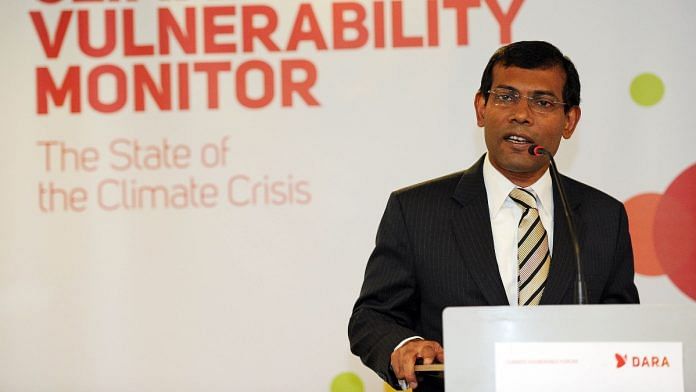New Delhi: The bomb blast that injured Maldives’ former president Mohamed Nasheed Thursday night was reportedly a terrorist attack, according to the country’s police.
A report in Sun Online, published Friday, quoted a police statement and said the attack on 53-year-old Nasheed, who is the Speaker in Maldives’ Parliament currently, was a terrorist attack and is being investigated with utmost priority.
The explosion took place near the former president’s residence as he was getting into a car. Along with Nasheed, who is undergoing surgery for his injuries, three bodyguards and one British man, who was walking by at the time of the incident, were also injured.
According to local media, President Ibrahim Mohamed Solih said he has asked for foreign assistance to investigate the incident and referred to it as “an attack on democracy and the Maldivian economy” during a televised address.
India’s External Affairs Minister S. Jaishankar also expressed concern over Thursday’s attack and wished Nasheed a speedy recovery, adding that he knew the former president will “never be intimidated”.
Maldives, a small island nation populated by Sunni Muslims, is not only known as a luxury vacation spot but also for its political turmoil and vulnerability to terrorist elements.
A 2018 UN report found that Maldives had sent the highest per capita number of foreign terrorist fighters to Syria and Iraq in prior years. “Some of these fighters are now returning to the islands, where there are few laws or structures to deal with the threat they may pose,” a 2019 US state government report notes.
Also read: India-Maldives ties poised to take quantum jump, scaling new heights — S. Jaishankar
A military coup, elections & political rivalry
Nasheed served as Maldives’ first democratically elected president from 2008 to 2012. In 2012 his government was toppled in a military coup, and he was sentenced to prison for 13 years on terrorism charges in 2015 — a move that civil rights groups viewed as politically motivated.
He then became Parliament Speaker, the second most powerful position in the country, following the 2019 election. A year earlier, he returned to Maldives after being exiled to escape his long prison term.
A journalist-turned-leader, Nasheed founded the Maldivian Democratic Party (MDP) in 2003. He won the country’s first multi-party elections in 2008 with 54 per cent of the vote, beating strongman Maumoon Abdul Gayoom who had ruled the country for 30 years. Current president, Solih, is also one of the founding members of the MDP.
After the 2012 coup, President Mohamed Waheed Hussain Manik came to power. The members of his cabinet were mostly veterans of the Gayoom-led government. At the time, Indian PM Manmohan Singh sent a letter of support to the new president, much to Nasheed’s dismay.
In 2013, Abdulla Yameen, Gayoom’s half-brother, won the delayed presidential run-off election with over 51 per cent of the vote. Nasheed conceded defeat and called it “a happy day” that ended two years of political instability. However, he became a fierce critic of Yameen after it was perceived that his government was cozying up to China.
Under Yameen’s watch, Maldives signed China’s Belt and Road Initiative and key contracts were made with Chinese companies, including upgrading the Maldives airport and building a 2km-China-Maldives Friendship Bridge.
According to Anand Kumar, Associate Fellow, Institute for Defense Studies and Analyses, Yameen was not the first pro-Beijing ruler.
“The policy was started by none other than Maumoon Abdul Gayoom who befriended China to counter-balance India,” he wrote in a column.
Yameen’s government also inked a Free Trade Agreement with China, a move that irked India. President Solih has also considered scrapping the agreement.
Solih won the September 2018 polls after leading a united opposition. Nasheed, expected to run for presidency, had to step aside after the Election Commission barred candidates convicted of criminal charges from contesting.
In light of the fact that @ElectionsMv have written to MDP saying that I can’t contest in the upcoming Presidential Elections, I have decided to relinquish my Presidential ticket. I hope to do this at MDP’s 3rd Congress. The EC’s decision is illegal and they must be sanctioned.
— Mohamed Nasheed (@MohamedNasheed) June 29, 2018
According to a report by the think tank Observer Research Foundation, all eyes have been on how the “new Maldives”, under Solih and Nasheed, intends to avoid a China-induced “debt-trap” into which neighbouring Sri Lanka has fallen.
Also read: Allowing US in Maldives to keep China out is a heavy price to pay. So why is India doing it?
Maldives has been vulnerable to terrorism
Ever since the 2007 Malé Sultan Park bomb blast that injured 12 people, Maldives has been vulnerable to terrorist elements. The island nation saw many terror incidents in the first half of 2020, from a stabbing in February to a harbour fire in April.
For a determined extremist group, the Maldives tourism industry is an easy target as it is possible to attack or take hostage tourists in a resort or aboard a cruise, wrote Maldivian academic Ahmed Niyaz in a 2010 research paper.
He also argued that a small country like the Maldives has a harder time absorbing the financial impact of terrorist attacks.
To counter terrorism, the government passed two key laws in 2014: The Prevention of Money Laundering and Terrorism Financing Act, and the Prevention of Terrorism Act. The latter led to the National Counterterrorism Centre in 2016.
Yet, as of December 2019, approximately 1,400 “religious extremists” remain active in the Maldives.
There have also been concerns about a wave of radicalisation that has swept the island in recent years. Officially, 173 radicalised Maldivians have traveled to Syria to fight alongside jihadist groups linked with al Qaeda and the Islamic State, while 432 have attempted to travel to Syria.
Also read: Foreign Secy Shringla lauds Maldives’ ‘India First’ policy, assures Covid recovery support



